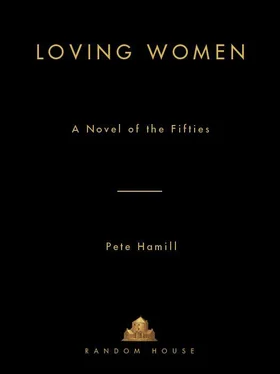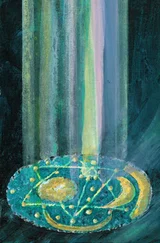I was supposed to be guarding a dumpster, one of those metal bins that was filled over the course of a week with garbage and junk and then lifted onto a truck and taken away and emptied. It was big enough to hold a car. I’d seen them in boot camp, but even in that land of total chickenshit I was never asked to guard one. I walked around it, feeling foolish with my rifle that didn’t shoot.
There was a barbed-wire fence just past the dumpster and empty black fields beyond and away off lights moving on the highway. Obviously, I thought, feeling hipper than Cannon or the task before me, the Russians weren’t about to steal a giant garbage can. So this watch was really about staying awake. They called it Building Discipline. Usually that meant you did something useless just because someone commanded you to do it. You stayed up all night, watching for a patrol to come around in a jeep, and the patrol came around in the jeep just to make sure you stayed up all night. The Navy. The goddamned Navy.
But after a while I realized it took too much energy to stay pissed off. I started feeling good out there in the open, with the steady drone of insects coming from the fields and silvery clouds moving across the stars. The darkness smelled of the sea and was so humid I thought I could grab it and shape it, pack it like a snowball, throw it at the stars. There was no purpose to my being there, but in all the years since, as I’ve stayed up through the night working with purpose, developing film, making love, arranging tickets and passports and visas for my next stop, I’ve sometimes longed for those nights without meaning under the stars of Pensacola, when I was solitary and young.
I remember my eyes adjusting to the darkness and how I began to see the varieties of the color black. A green black beyond the barbed wire. The pale black of wild grass. The blacker black of tree trunks. I tried to imagine the way Roy Crane would draw it. All grays and blacks. He would probably add some palms to show it was Florida, even though there were no palms out here. Along the edge of the barracks, the trees were all pine. But I knew that an artist could change things to make them better or truer; in fact, it was probably his duty to make such changes. I was sure Crane always did. And so did Caniff: They made pictures that were truer than photographs. They made a lot of things neater than life. The world was a mess, and all the things they taught us in school were lies. But when an artist shaped the world, things always worked out better. An artist would have that curly-haired woman stay on the bus and take the young sailor home with her and make love to him and stay with him forever.
I opened the door to the dumpster. A foul odor rose from it. I stepped closer and objects began to reveal themselves: automobile tires, broken pieces of metal, a lot of paper torn in strips, dry palm fronds. But there was a wet jumble of other stuff that I couldn’t make out. The smells were suddenly more distinct: rusting iron, burnt paper, rubber, decay. Not city odors. But they didn’t make me feel I was in the country either. And I thought: It’s a Navy smell. I’ll only smell this in the Navy. I’ll remember this mixture of smells all my life . And I did.
Then I saw lights bobbing in the darkness on the far side of the field. They moved left, then stopped. I picked up the rifle. The lights moved again, stopped, then were moving again and getting larger. I could hear a car engine now, and then the lights were very bright and the jeep was fixing me with its high beams, stopping a dozen feet away. I held the rifle at the ready and tried to look tough.
“Who goes there?” I said. Like in a bad movie.
No answer. A man stepped out of the car on the passenger side, but I couldn’t see him clearly in the glare of the lights. He came forward. It was Cannon. Carrying a clipboard.
“You’d be dead by now, boy,” he said. He came very close, fixing me with those lashless eyes. “You sposed to ask for a password, boy, and if it ain’t forthcomin, you shoot.”
“Nobody gave me a password. Sir.”
“Then whyn hell didn’t you ask for one, boy?”
“I just got to this base. Sir . I don’t know the routine. Sir . I was—”
“Don’t explain, boy. Admit .”
“Admit what?”
“Admit you done fucked up, shitbird! You are tellin me you went to a United States military post, on duty , without askin anyone what you was sposed to do. You didn’t get a password. You didn’t do your duty , boy, cause you never did find out what it was .”
I said, “If you were a Russian, I couldn’t do my duty anyway. This goddamned rifle doesn’t shoot! So what’s the big deal?”
Cannon blinked. Then he turned to the driver of the jeep, still out of sight behind the glare of the headlights.
“You hear that, Infantino? You hear what this shitf’brains just said?”
“No, sir.”
“He said, ‘What’s the big deal?’ ”
I could see veins pulsing in Cannon’s neck.
“So it looks like we got us another wiseass punk from New York, don’t it, Infantino?”
Infantino didn’t answer.
“And when you scratch a New York wise guy, whatta you find trying to get out? You find a New York big shot. And all we need is some seaman deuce thinks he’s a big shot. Isn’t that right, Mister Infantino?” Then he got angry at Infantino’s silence. “Are you deaf , boy? Do you hear me, boy?”
“Yes, sir, I hear you.”
“Well, what should we do with this big shot, this Mister Wiseass Brooklyn New York?”
I’d never told him I was from Brooklyn, so I knew he’d examined my papers.
“That’s obviously up to you, sir,” Infantino said from behind the brights. His voice was raspy, familiar.
“I tell you what I’d like to do,” Cannon said. “I’d like to shitcan him right out of this man’s Navy. Couple years in the brig, a D.D., and gone.” He sighed. “But this new damned Navy, you can’t do it like that anymore.”
He handed me the clipboard and a ballpoint pen. “Sign here,” he said, and pointed to a box on a ruled sheet of paper. The form listed the various posts on the base and the times. Each of the other guys on duty had signed in a box on the right. I did the same. Cannon’s fingernails were neatly trimmed and polished.
“At ease,” he said. I relaxed. Then he squinted at me and changed his tone and barked: “Tain-SHUN!” I snapped to attention, the rifle on my shoulder. “Now you stay like that till yore relieved, wiseass,” he said. “You even dream about takin a rest, I’ll put you on report.”
He turned on his heel, walked quickly to the jeep and got in. They moved off quickly. Briefly, I glimpsed the other sailor: dark-haired and ruddy-faced. In dungarees.
It was much darker after the jeep left. I stood at attention until the lights of the jeep merged with the lights of the main gate, then I squatted beside the dumpster with the rifle on my lap. Fuck you, Cannon. I didn’t sleep, but I wasn’t awake either; my anger was like an extra pulse. I tried something I did back home when the furies got to me. I made my mind blank. Like a blackboard after it’s washed. I saw Cannon, the dumpster, even The Bluejackets’ Manual on the slate. Then I pulled a wet cloth across it. Twice. And they were gone. I stared at the empty slate. It was blank and pure, like peace.
Then I came suddenly awake. The lights of the jeep were moving again. I stood up and brushed off my dungarees. I snapped to attention, the rifle on my shoulder. My heart thumped. Maybe they had those field glasses that let you see in the dark. Maybe they had photographs of me goofing off. Then the jeep arrived with a squeal of brakes. Infantino jumped from behind the wheel without shutting off the engine. He came right up to me and handed me two doughnuts in a napkin and a cardboard cup of coffee.
Читать дальше












